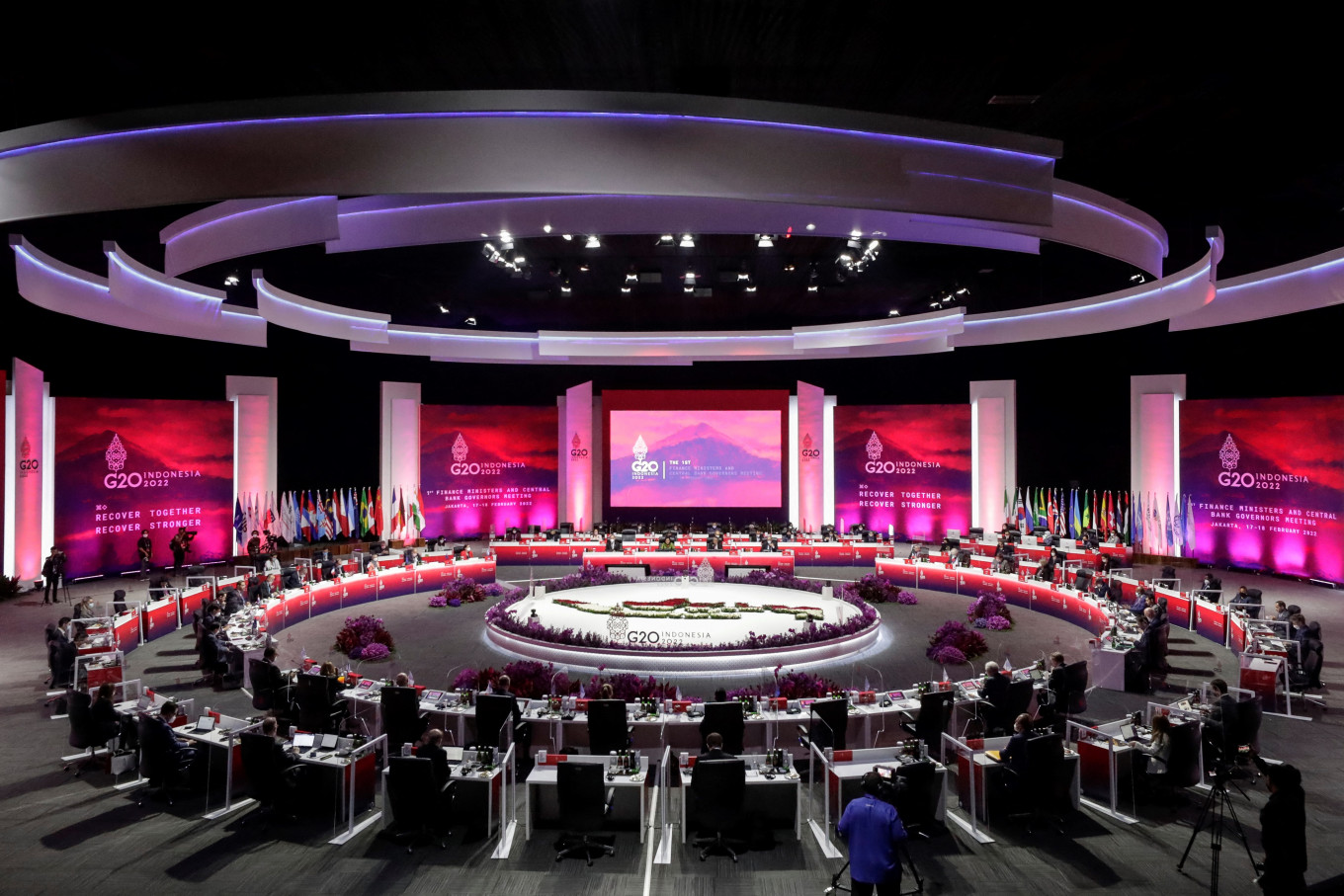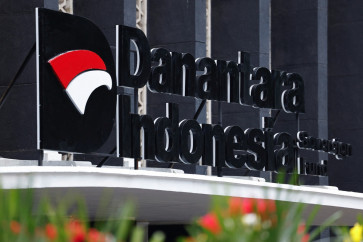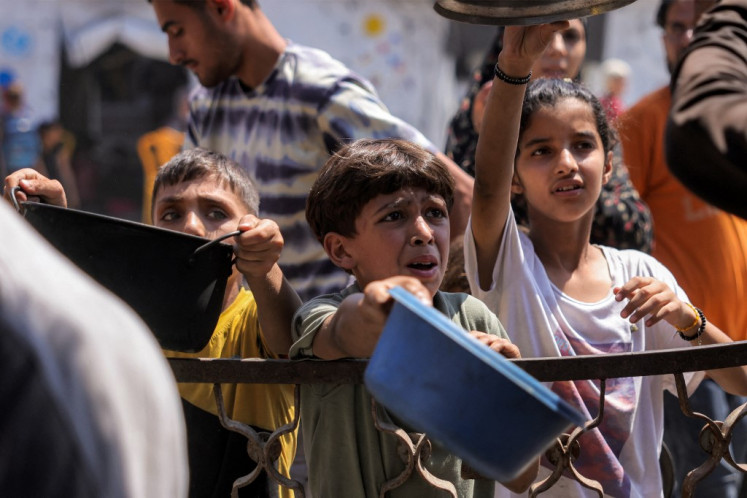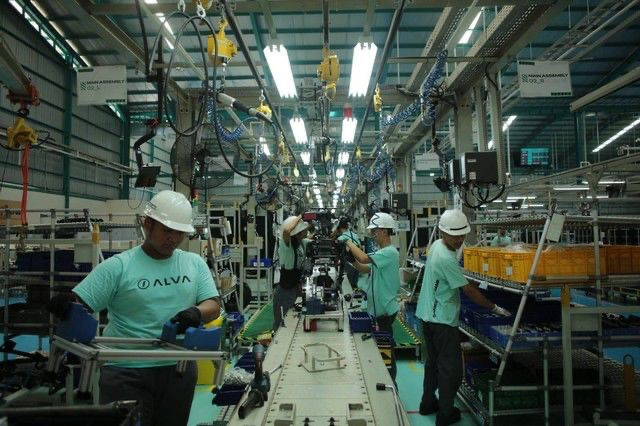Popular Reads
Top Results
Can't find what you're looking for?
View all search resultsPopular Reads
Top Results
Can't find what you're looking for?
View all search resultsManeuvering economic recovery amid geopolitical tension
As the rotating chair and host of Group of 20 (G20) this year, Indonesia plays an important role in leading the world’s agenda as many global problems needs to be addressed as part of the global post- COVID-19 recovery efforts.
Change text size
Gift Premium Articles
to Anyone

As the rotating chair and host of the Group of 20 (G20) this year, Indonesia plays an important role in leading the world’s agenda. Many global problems need to be addressed as part of global recovery efforts post-COVID-19. Through the theme of Recover Together, Recover Stronger, the country invites the world to focus on global cooperation for the post-pandemic recovery and the importance of sustainable development going forward. However, with heightening geopolitical tensions, it will be a challenging journey if there is a lack of mutual understanding in approaching these issues.
One of the most important issues on the G20 agenda is how developing economies can be protected from the spillover effect of the exit policies of advanced countries during the economic recovery, including the scarring effect of the post-pandemic crisis. Hence, Indonesia has called for world solidarity in the economic recovery, so that nations can work hand in hand not only to recover together, but also recover stronger.
The COVID-19 pandemic has shown both the positive and negative sides of global cooperation. The innovation of the COVID-19 vaccine has shown what is is possible to achieve within a limited amount of time through cooperation. On the financial side, international organization has also managed to draw pandemic funding to tackle the emergency economic impacts, especially for emerging economies. However, there have also been issues in cooperation, such as vaccine nationalism where global access for vaccines was limited for developing and high-populated countries in need, as some advanced countries refused to export vaccines.
This meant vaccine supplies to emerging countries were very limited, causing a snowball effect resulting in the loss of trillions of US dollars in the global economy. It has also resulted in the emergence of various evolved strains of COVID-19, which became more deadly or infectious, meaning that the pandemic has been prolonged. This situation could have been prevented and would have cost less in damages had the vaccines been more accessible for the whole world.
Although Indonesia has a very good relationship with the global superpowers, namely the United States and China, the ongoing tension between the two nations has not subsided, especially since trade wars were waged. The conflict between the superpower countries has not only made things worse for both of them, but has also affected other countries due to the tension.
The situation is made worse by the current global supply chain disruptions, which hurt smaller economies the most. In addition, there is also still a big gap in the global health architecture, where less developed countries have scarce access to vaccines, medicine and health facilities. In such a situation, no country benefits from the prolonged geopolitical feud, as no single country can solve all of these issues without global cooperation and mutual understanding. While the global economy is recovering from the impacts of the pandemic, the recovery is seemingly still uneven between advanced and emerging economies.
Advanced economies will be able to normalize stimulus policy soon while emerging economies, including Indonesia, still need to maneuver fiscal policies to accelerate recovery. However, advanced economies should realize that their economic growth is inseparable from the emerging markets, hence the recovery of developing countries is imperative.
Indonesia is an example of a developing country with an emerging market and demographic bonus. Such developing countries still have a large amount of room for big investments, where advanced countries can participate through foreign direct investment. But in this situation, emerging economies face much higher interest rates than the advanced economies and the lack of investment-grade ratings.
This causes a wider gap between advanced countries with low-interest rates and less developed countries that have to pay more than five times the interest rate. The scarring effect will be worse in the long run, as developing countries are financing the post-pandemic recovery through their fiscal instruments. Should this be prolonged, the widening gap between these economies will even further reflect the unfairness of the global financial system, which should be addressed and reformed in the G20 meetings as well.
Multilateral organizations should also provide assistance to developing countries that require large fiscal space. It is important to ensure these countries are able to reduce poverty levels to allow their economies to recover and achieve the necessary growth to be able to pay back their debt and keep healthy fiscal conditions.
Indonesia has an opportunity to embrace all global powers and influence them to work together for better cooperation through the G20 agenda. It has expressed the importance of bolstering post-COVID global public health systems, as it pushes to become a global hub for vaccine development and distribution. Indonesia has also emphasized the need to optimize inclusive technology and digitalization in financial services for underserved communities and business sectors globally, which will improve human wellbeing.
Apart from this, Indonesia can also address the importance of financing green developments to kickstart the green economy with its many resources, such as renewable energies, its solar potential, biofuels and the green and blue hydrogen economy. Although emerging economies still face challenges in the transition from carbon to green energy, advanced economies could assist in developing clean energy-based industries and long-term programs to build a sustainable green economy.
Holding the G20 presidency baton, Indonesia has a big responsibility to drive the global economic recovery, to regain and accelerate its growth post-COVID and to be the agent of an inclusive and sustainable world recovery. Hence having clear guidelines and advanced-looking policies, while synchronizing the global powers in an orchestrated effort, is necessary to transform these challenges into better opportunities and sustainable growth, amid the stormy geopolitical situation.
*****
The writer is a public policy analyst at Mandiri Institute, an independent research think tank of Bank Mandiri, focusing on public policy, financial and the banking sector.










